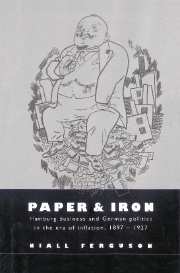Book contents
- Frontmatter
- Contents
- List of figures
- Preface
- List of abbreviations
- Introduction
- 1 Golden years
- 2 The sinews of war
- 3 The political economy of revolution
- 4 Versailles and Hamburg
- 5 Relative stabilisation
- 6 The failure of ‘fulfilment’
- 7 Dissolution and liquidation
- 8 The legacy of the inflation
- Epilogue: Hitler's inflation
- Appendix
- Bibliography
- Index
1 - Golden years
Published online by Cambridge University Press: 14 October 2009
- Frontmatter
- Contents
- List of figures
- Preface
- List of abbreviations
- Introduction
- 1 Golden years
- 2 The sinews of war
- 3 The political economy of revolution
- 4 Versailles and Hamburg
- 5 Relative stabilisation
- 6 The failure of ‘fulfilment’
- 7 Dissolution and liquidation
- 8 The legacy of the inflation
- Epilogue: Hitler's inflation
- Appendix
- Bibliography
- Index
Summary
On II June 1913, a leviathan was launched in Hamburg. Weighing over 52,000 gross tons, the Imperator not only established the Hamburg–Amerika shipping line as the largest in the world; with its two later sister ships, the Vaterland and the Bismarck, it confirmed Hamburg's shipyards as equal to any in Britain. The ‘Hapag’'s publicity department described the Imperator as ‘a work of gigantic forms’, of ‘gigantic realities and still more gigantic portents’, and illustrated the point with scale drawings showing the upended ship alongside the Hamburg Rathaus, Ulm cathedral and the Wartburg. In a similar vein, the ship-builders Blohm and V0ß trumpeted that the still bigger Vaterland had been ‘built on the biggest slip, had received her equipment under the biggest crane, and […] would be launched in the biggest floating dock in the world’.
This economic giganticism is open to a variety of interpretations. Clearly, to many contemporaries, these leviathans embodied the great advances made by German industry and engineering since the mid nineteenth century. Yet from a purely economic standpoint, they were of dubious value. As expensive as they were immense, the three ships catered almost exclusively for luxury transatlantic passenger traffic and were not expected to break even; indeed, it was assumed by the Hapag that they would be subsidised by the line's freight business. Their social significance seems more obvious. With their marble sinks and electric heating, they were built for the delectation of a wealthy, cosmopolitan elite by an army of semi-skilled manual workers housed in the poorly plumbed, under-heated ‘rent-barracks’ of Hamburg's proletarian quarters.
- Type
- Chapter
- Information
- Paper and IronHamburg Business and German Politics in the Era of Inflation, 1897–1927, pp. 31 - 92Publisher: Cambridge University PressPrint publication year: 1995



